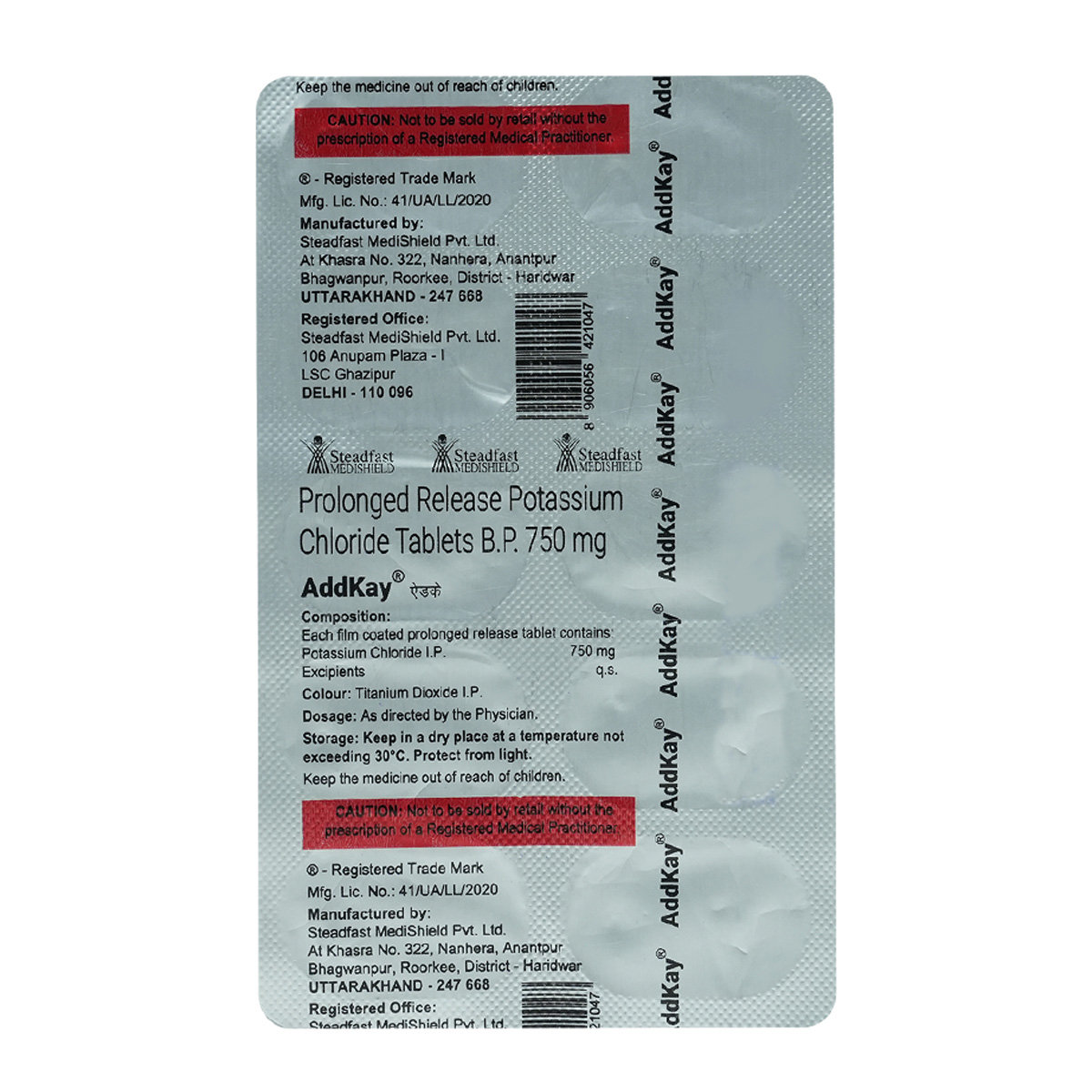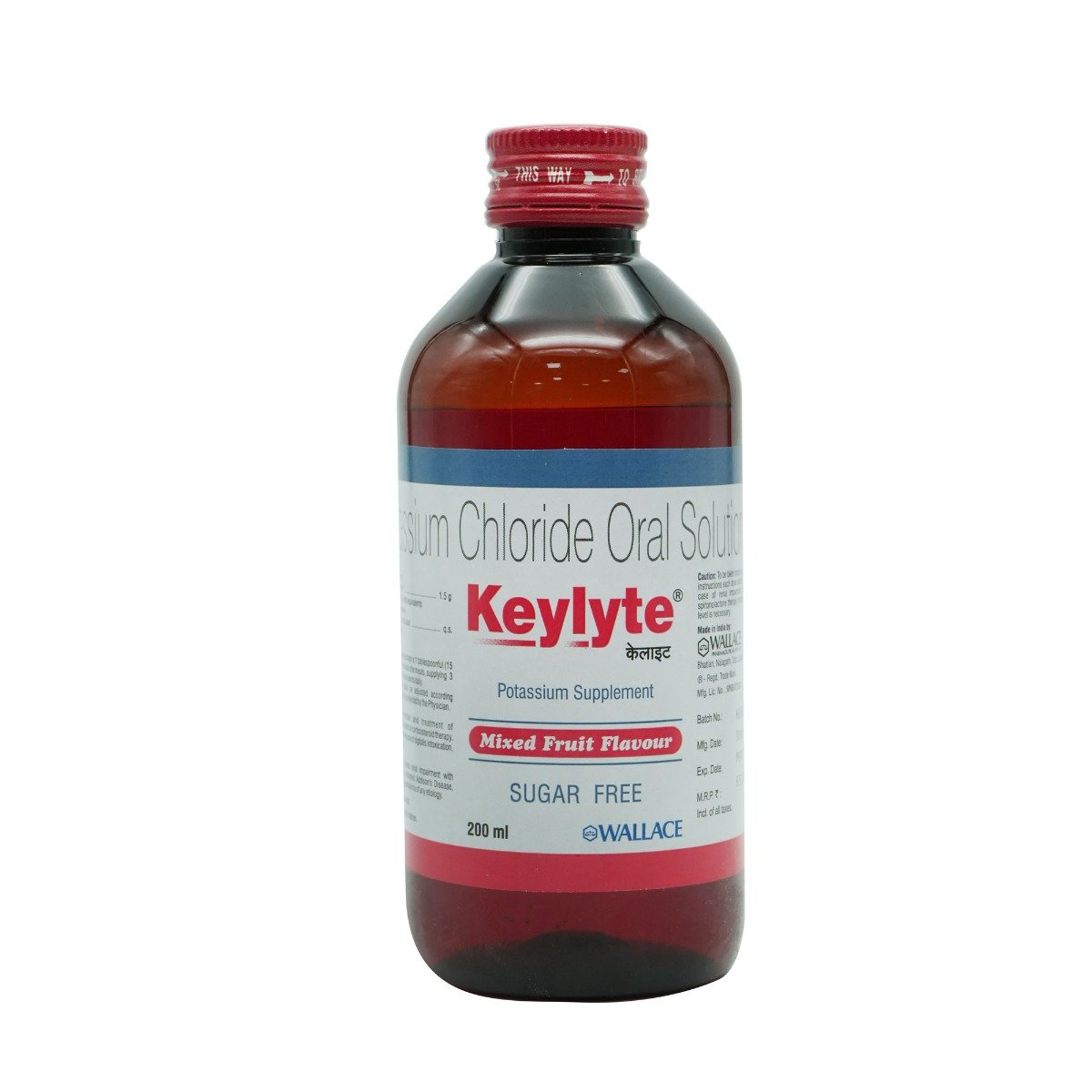Potassium Chloride
About Potassium Chloride
Potassium Chloride is indicated in the prevention and treatment of hypokalaemia (low potassium) with or without metabolic acidosis (build-up of acid in the blood), in familial periodic paralysis (inherited neurological disorder) and digitalis intoxication.
Potassium Chloride contains ‘Potassium chloride’, which works by replenishing the potassium, thereby treating hypokalaemia.
Potassium Chloride can cause some side effects, such as diarrhoea, abdominal pain/discomfort, flatulence, nausea, and vomiting. Most of these side effects do not require medical attention and will resolve gradually over time. However, you are advised to talk to your doctor if the side effects persist or worsen.
Avoid concomitant use of potassium-sparing diuretics (e.g., spironolactone, triamterene or amiloride) with Potassium Chloride as it may cause hyperkalaemia (high potassium levels). Consult a doctor if you are pregnant or breastfeeding. Keep your doctor informed about your health condition and medicines to rule out any side effects/interactions.
Uses of Potassium Chloride
Medicinal Benefits
Potassium Chloride is indicated in the prophylaxis and treatment of hypokalaemia (low potassium) in familial periodic paralysis (inherited neurological disorder), digitalis intoxication, with or without metabolic acidosis (build-up of acid in the blood), in patients for whom diuretic dose reduction or dietary management with potassium-rich foods are insufficient. Potassium Chloride contains ‘Potassium chloride’, which works by replenishing the potassium, thereby treating hypokalaemia.
Directions for Use
Storage
Side Effects of Potassium Chloride
- Abdominal pain/discomfort
- Nausea
- Vomiting
- Diarrhoea
- Flatulence
Drug Warnings
Do not take Potassium Chloride if you are allergic to any of its components. Inform your doctor if you have hyperkalaemia (high potassium levels), kidney disease, liver cirrhosis, adrenal gland disorder, severe burn, severe dehydration, diabetes, heart disease, high blood pressure, stomach or intestinal bleeding, blockage in stomach or intestine, chronic diarrhoea or if you are taking potassium-sparing diuretics. Consult your doctor if you are pregnant or breastfeeding.
Drug Interactions
Drug-Drug Interactions: Inform your doctor if you are taking potassium-sparing diuretics, angiotensin-converting enzyme (ACE) inhibitors, or angiotensin receptor blockers (ARB).
Drug-Food Interactions: No interaction found/established.
Drug-Disease Interactions: Inform your doctor if you have metabolic acidosis.
Drug-Drug Interactions Checker List:
Safety Advice

Alcohol
consult your doctorIt is unknown if alcohol interacts with Potassium Chloride. Please consult your doctor.

Pregnancy
consult your doctorPlease consult your doctor if you are pregnant. Your doctor will prescribe only if the benefits outweigh the risks.

Breast Feeding
consult your doctorPlease consult your doctor if you are breastfeeding. Your doctor will decide whether breastfeeding women can take Potassium Chloride or not.

Driving
consult your doctorIt is not known if Potassium Chloride alters your ability to drive. Drive or handle machinery only if you are alert.

Liver
consult your doctorPlease consult your doctor if you have a liver impairment or any concerns regarding this.

Kidney
consult your doctorPlease consult your doctor if you have kidney impairment or any concerns regarding this.

Children
consult your doctorPlease consult your doctor. Your doctor will decide the dose of Potassium Chloride depending on the age and body weight of your child.
Habit Forming
Diet & Lifestyle Advise
- Follow a well-balanced diet.
- Exercising regularly helps in improving overall health.
- Rest well, and get plenty of sleep.
- Avoid smoking and alcohol consumption.
- Meditation and yoga can help lower stress.
- Avoid processed and fried food.
Special Advise
Your doctor may recommend regular blood tests and ECG monitoring to check heart rate.
Patients Concern
Disease/Condition Glossary
Hypokalaemia (low potassium): It is a condition in which the serum concentration of potassium is below normal. Inadequate dietary intake of potassium, chronic kidney disease, use of medication (such as diuretics or antibiotics), and loss of gastrointestinal fluids through diarrhoea, vomiting or laxative use could be the causes of hypokalaemia. Symptoms include weakness, muscle pain, constipation, palpitations, tingling or numbness.
FAQs
Potassium Chloride works by replenishing the potassium, thereby treating hypokalaemia.
Please consult your doctor before taking potassium supplements or products that contain potassium, salt substitutes or low-salt dietary products with Potassium Chloride, as it may lead to high potassium levels.
To treat your condition effectually, continue taking Potassium Chloride for as long as your doctor has prescribed it. Do not be reluctant to speak with your doctor if you experience any difficulty whilst taking Potassium Chloride.







